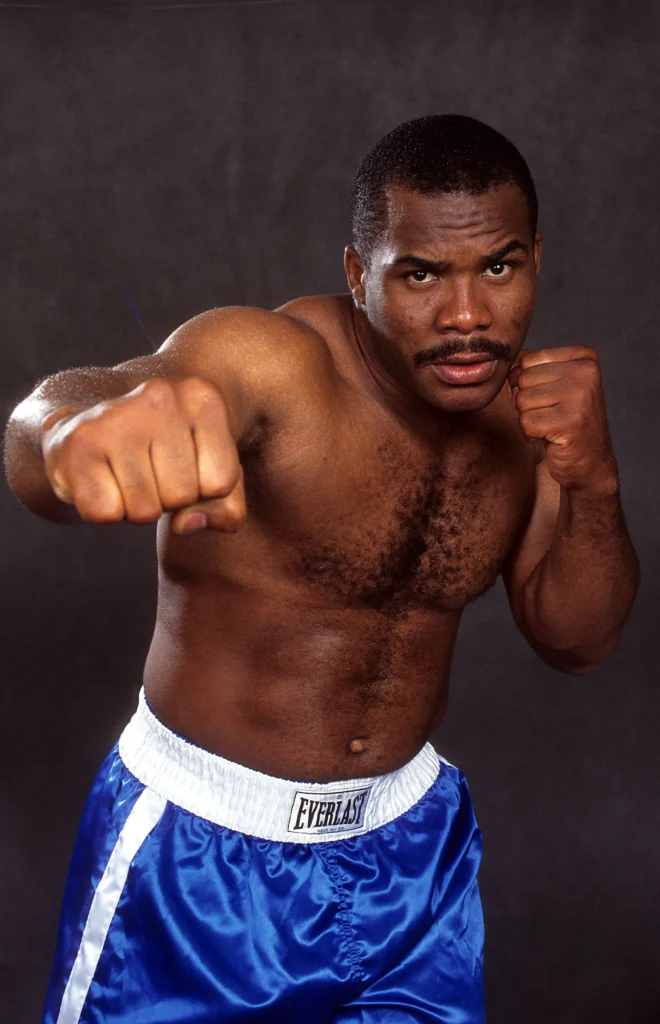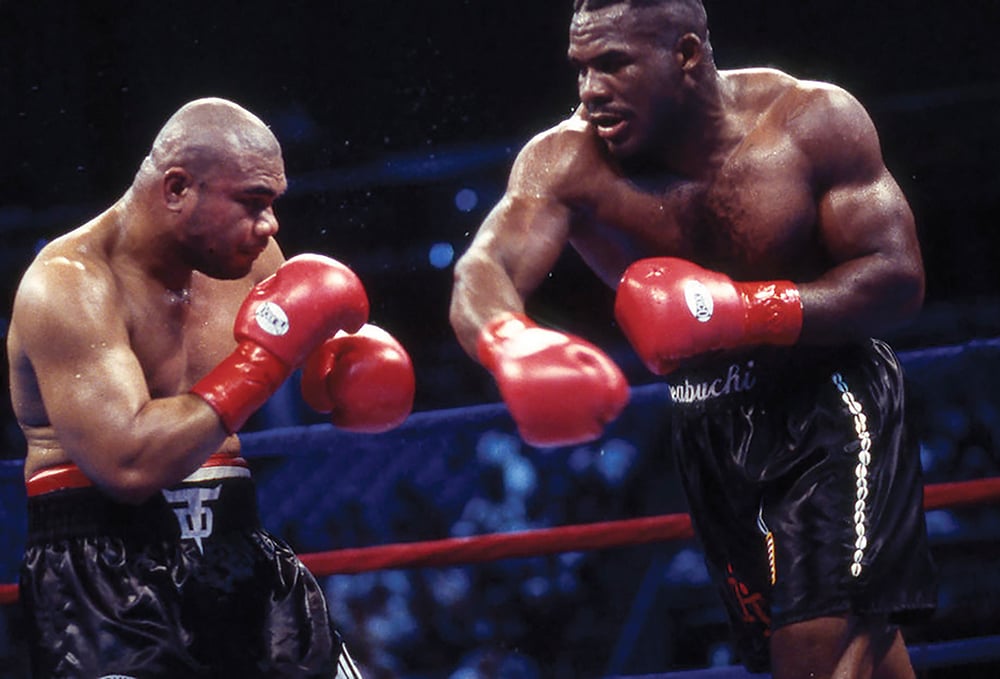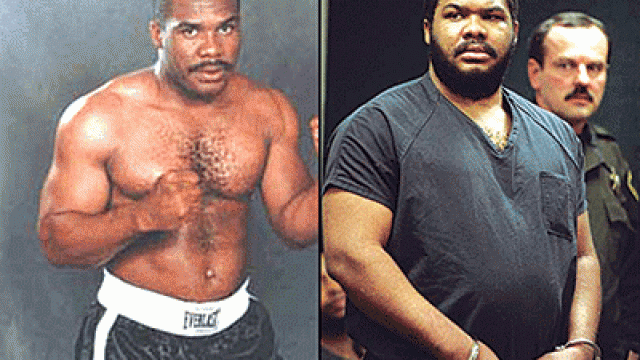Weight:(heavyweight), Height:6 ft 2 in (188cm) Reach:76in (193cm) Stance: Orthodox Boxing Record 20-0(15KO)

Introduction to Ike Ibeabuchi: A Brief Biography
Ike Ibeabuchi, a Nigerian former professional boxer, captivated the heavyweight division from 1994 to 1999. Born on February 2, 1973, in Isuochi, Nigeria, Ibeabuchi’s entry into boxing was marked by his incredible talent and power, which quickly set him apart in the heavyweight category. He is perhaps best remembered for his victory over David Tua in 1997, a fight that remains a highlight of his career due to its intensity and the record for the most punches thrown in a heavyweight bout.
Despite his promising career, Ibeabuchi faced significant challenges outside the ring, including legal issues that ultimately led to his imprisonment. Before his incarceration, Ibeabuchi had amassed an impressive record of 20 wins, no losses, with 15 of those wins coming by knockout. His career victories include notable fights against highly ranked contenders and future world champions, such as Chris Byrd in 1999 .
Ibeabuchi’s life outside the ring has been tumultuous, marked by a series of legal challenges that began a few months after his fight with Tua. These issues ranged from a serious car accident, which the courts concluded was an attempted suicide, to multiple allegations of sexual assault that led to his imprisonment . Despite these challenges, Ibeabuchi has sought to make a comeback in boxing, reflecting on a career that might have been one of the most legendary in the sport’s history had it not been for these legal troubles
Early Life and Entry into Boxing
Ike Ibeabuchi’s early life and foray into boxing is a tale of ambition, inspired by iconic moments in sports history. Born on February 2, 1973, in Isuochi, Nigeria, Ibeabuchi’s path to boxing stardom began in his home country, where he first entertained the idea of joining the Nigerian military. However, his plans took a dramatic turn after witnessing James “Buster” Douglas’s upset victory over Mike Tyson to win the World Heavyweight Championship in 1990. This iconic fight, which captured the world’s attention, inspired Ibeabuchi to pursue boxing instead of a military career.
As an amateur, Ibeabuchi demonstrated considerable talent, twice defeating countryman and eventual 1996 Olympic Bronze Medalist Duncan Dokiwari. This success in the amateur ranks prompted Ibeabuchi and his mother to emigrate to the Dallas area in 1993, seeking better opportunities for his boxing career. Upon settling in the United States, Ibeabuchi quickly made his mark by winning the Dallas and Texas Golden Gloves tournaments in 1994. This early success laid the groundwork for his professional debut and subsequent career in the heavyweight division.
Under the guidance of Curtis Cokes, a former world welterweight champion, the undefeated prospect Ibeabuchi transitioned to professional boxing. He made a striking debut, winning his first fight by knockout, and quickly garnered attention for his powerful punches and aggressive fighting style. Ibeabuchi’s early career was characterized by a relentless pursuit of greatness, marked by a series of victories that showcased his potential to become one of the sport’s leading figures
Rise to Prominence
Ike Ibeabuchi’s rise to prominence in the heavyweight boxing division was meteoric, marked by notable early fights that showcased his potential to dominate the sport. One of the most significant moments in his career came with his fight against David Tua in 1997. This bout not only established Ibeabuchi as a formidable contender in the heavyweight division but also set records for the most punches thrown in a heavyweight fight, underscoring the intensity and competitiveness of the match. Ibeabuchi won against Tua , a previously undefeated and highly ranked contender, via a unanimous 12-round decision, was a breakthrough that positioned him as a top contender for the world heavyweight title.
Following his victory over Tua, Ibeabuchi continued to build on his momentum with a series of wins, including a notable victory against Chris Byrd in 1999. Byrd, a 1992 Olympic silver medalist and future world heavyweight champion, was known for his quick and slick boxing style. The fight with the future heavyweight champion Byrd was competitive through the initial rounds, but Ibeabuchi’s power became the decisive factor, leading to a victory by knocking out Chris Byrd in the fifth round .
These victories were crucial in Ibeabuchi’s career, showcasing his skill, power, and determination. He finished his career with an impressive record of 20 wins 0 loses and 15 KO’s.However, his ascent in the boxing world was abruptly halted due to legal issues and personal challenges outside the ring, leaving fans and analysts to speculate on what could have been if Ibeabuchi had continued his career without interruptions.

The Tua Fight: A Heavyweight Epic
The fight between Ike Ibeabuchi and David Tua on June 7, 1997, was a heavyweight showdown that set records for its relentless pace and intensity. Both fighters displayed remarkable endurance and power, with Ibeabuchi ultimately winning by unanimous decision. This bout not only set a CompuBox record for the most punches thrown in a heavyweight fight but also significantly boosted Ibeabuchi’s standing as a top contender in the division . For more details, visit BoxRec’s page on the fight.
Challenges Outside the Ring
Ike Ibeabuchi faced significant legal challenges outside the ring, including a serious car accident involving the abduction of his former girlfriend’s son, leading to imprisonment. Additionally, he was involved in multiple sexual assault cases, further complicating his legal situation and impacting his boxing career and legacy. These issues culminated in prison sentences and interrupted what many saw as a promising career, overshadowing his achievements in the ring.
The Unfulfilled Potential
Ike Ibeabuchi’s unfulfilled potential is often discussed in the context of what he might have achieved in the heavyweight division, had his career not been derailed by legal issues. With his record, skills, and notable victories, comparisons to other heavyweights suggest he could have contended with the best of his era or any era, potentially securing a place among boxing legends. The boxing community frequently speculates on the high-profile matchups and championship opportunities that could have been part of his legacy. Frequently referred to as “the next Mike Tyson” because of his explosive power and aggressive fighting style, Ibeabuchi’s career was abruptly halted, leaving the sports world speculating about his potential to rival or even surpass the achievements of “the next Mike Tyson.”
Ibeabuchi’s Fighting Style and Technique
Ike Ibeabuchi, a name that stirs curiosity and speculation among boxing enthusiasts, remains one of the most intriguing “what if” stories in heavyweight boxing history. Known for his ferocity, technical skill, and untapped potential, Ibeabuchi’s fighting style and approach to the sport left an indelible mark despite his career being cut short. Here, we delve into the essence of his technique and the strategies that set him apart during his brief tenure at the pinnacle of heavyweight boxing.
Analysis of Fighting Technique
Ibeabuchi’s fighting style was a compelling blend of aggression, power, and surprisingly refined technique for a heavyweight of his era. Standing at 6’2″ and often weighing in at over 240 pounds, he possessed the physicality typical of a heavyweight but moved with the agility and finesse of a lighter fighter. This unique combination made him a formidable opponent inside the ring.
- Aggression and Pressure: Ibeabuchi was known for his relentless aggression and ability to apply constant pressure on his opponents. Unlike many heavyweights who might pace themselves to conserve energy, Ibeabuchi seemed almost to thrive on the intensity of close combat, pushing forward with a barrage of punches that often overwhelmed his adversaries.
- Power and Precision: Every punch Ibeabuchi threw was meant to do damage. His ability to generate power was not just a result of his physical build but also his technique. He was adept at rotating his core and transferring weight through his punches, which allowed him to deliver devastating blows with both hands.
- Defensive Skills: Despite his aggressive style, Ibeabuchi was not reckless. He had a good sense of distance and timing, which enabled him to avoid punches with subtle movements. His defensive skills, coupled with his sturdy chin, made him difficult to hurt, let alone knock down.
Signature Moves and Strategies
- The Jab: Ibeabuchi’s jab was a key component of his offensive arsenal. It was not just a tool for him to set up other punches but also a weapon in its own right. He used his jab to control the pace of the fight, to disrupt his opponents’ rhythm, and to create openings for his power shots.
- Body Work: Another hallmark of Ibeabuchi’s approach was his commitment to attacking the body. He understood the cumulative effect of body punches and employed them strategically to wear down his opponents over the course of a fight. His investment in body work paid dividends, particularly in longer bouts, as it sapped his adversaries’ energy and made them more susceptible to his power punches in later rounds.
- The Clinch: Ibeabuchi’s use of the clinch was both a defensive and offensive strategy. He used it to nullify his opponents’ offense, to impose his physical strength, and to take brief respites without disengaging completely. Within the clinch, he was adept at landing short, impactful punches that often went unnoticed by casual observers but were felt acutely by his opponents.

he Psychological Battle: Mental Health in Boxing
The world of professional boxing is not only a test of physical strength and endurance but also a significant mental battle. For fighters like Ike Ibeabuchi, the psychological challenges were as formidable as the opponents they faced in the ring. Ibeabuchi’s career, marked by extraordinary talent and tragic downfalls, highlights the critical importance of mental health support in the sport of boxing.Ike Ibeabuchi, a heavyweight boxer with a promising career, became notorious for his turbulent life outside the ring, marred by legal troubles and bizarre behavior, which some attributed to “evil spirits.” His career was abruptly derailed by criminal convictions, and during his incarceration, Ibeabuchi claimed that “evil spirits” were haunting him, a notion that added a layer of mystery and tragedy to his story. Despite a record of 20 wins and no losses, with 15 knockouts, his potential remained unfulfilled, overshadowed by his struggles with mental health and the law.
Ibeabuchi’s Mental Health Battles
Ike Ibeabuchi, a heavyweight boxer known for his power and potential to become one of the all-time greats, faced significant mental health challenges that ultimately impacted his career and life outside the ring. Despite his early success, Ibeabuchi’s behavior outside of the ring raised concerns about his mental well-being. Eventually he was mentally ill with psychotic episodes, including delusions and hearing voices. Ibeabuchi called himself “The President”, probably due to his personal issues.
- Erratic Behavior and Legal Issues: Ibeabuchi’s legal troubles and erratic behavior outside the ring were early indicators of underlying mental health issues. His actions led to legal confrontations that significantly halted his boxing career and eventually led to incarceration, highlighting the need for early intervention and support for mental health.
- Diagnosis and Incarceration: During his incarceration, Ibeabuchi received psychiatric evaluations that pointed to serious mental health conditions. The lack of early mental health support and intervention not only affected his boxing career but also led to a life-altering legal battle, underscoring the crucial need for mental health awareness and support within the boxing community.
FAQs about Ike Ibeabuchi
What was Ike Ibeabuchi known for in his boxing career?
Ike Ibeabuchi was known for his powerful punching ability, impressive speed for a heavyweight, and the potential many saw in him to become a world champion. His most notable victories include a win against David Tua in 1997, a fight that set a record for the most punches thrown in a heavyweight bout, showcasing his stamina and aggressive fighting style.Ike Ibeabuchi was often seen as the only fighter capable of challenging the reigning world champions, bringing a unique combination of power and skill to the ring that made him a formidable contender. His potential to become a world champion was widely recognized, with many believing he had the talent to dominate the heavyweight division and secure the world champion title.
Why did Ike Ibeabuchi’s boxing career come to an abrupt end?
Ibeabuchi’s boxing career came to an abrupt end due to legal issues leading to his incarceration. In 1999, he was arrested and later convicted on charges related to a sexual assault case, and subsequent legal troubles further compounded his problems, effectively halting his rising career.
What is Ike Ibeabuchi’s record in professional boxing?
Ike Ibeabuchi retired with an undefeated record in professional boxing. In his professional boxing career, he compiled a record of 20 wins, 0 losses, with 15 of those wins coming by way of knockout. He became famous with the Tua fight and the win over Chris Byrd.
Did Ike Ibeabuchi ever compete for a world title?
Despite being a rising star in the heavyweight division and being in line for a title shot, Ike Ibeabuchi never competed for a world title. His legal issues arose just as he was positioning himself for a world title fight, preventing him from realizing his full potential in the sport.Ike Ibeabuchi’s rise in the boxing world was meteoric, marked by a notable victory that positioned him as a serious contender for the WBC International Heavyweight title. This triumph underscored his raw power and technical prowess in the ring, capturing the attention of the boxing community and signaling his potential to become a dominant force in the heavyweight division. Unfortunately, Ibeabuchi’s promising career was cut short by legal and personal issues, preventing him from ever competing for the prestigious WBC International Heavyweight title and leaving fans to wonder what heights he might have reached.
What were some of Ike Ibeabuchi’s mental health issues?
Ike Ibeabuchi faced significant mental health issues throughout his career, marked by erratic mental states and troubling behavior. His mental health struggles became apparent when he claimed to be in communication with a new persona, whom he referred to as “the president.” This alter ego, “the president,” was a manifestation of his psychological problems, leading to unpredictable actions and affecting his personal and professional life. His mental health challenges, including this creation of a “new persona,” were severe enough to raise concerns about his fitness to compete and eventually contributed to the abrupt end of his boxing career.
Was Ike Ibeabuchi ever considered to fight Lennox Lewis?
Yes, Ike Ibeabuchi was considered a potential challenger for Lennox Lewis before his career was abruptly halted. The boxing community frequently speculated about a match between Ibeabuchi and Lennox Lewis, given Ibeabuchi’s rising profile and knockout power. Many believed that Ibeabuchi had the skills to give Lennox Lewis a significant challenge, potentially even capturing the heavyweight title from Lewis. Discussions about a fight between Ibeabuchi and Lennox Lewis were rife with anticipation, as it would have been a clash between two of the era’s most formidable heavyweights.
Was Ike Ibeabuchi’s arrest related to an incident in a hotel room with his former girlfriend?
Ike Ibeabuchi’s arrest was indeed related to a serious incident involving his former girlfriend in a hotel room. The situation escalated, leading to legal consequences that significantly impacted his life and career.